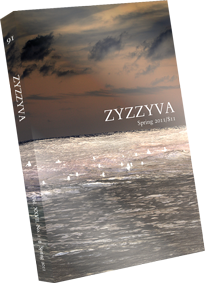Maria and I went to a party in an empty airplane hangar. The idea was to eat some cake and forget about the war. The place was decked in streamers and flags. There was punch and some folks came dressed as famous prisoners. I was having a pretty good time talking to Nelson Mandela, when the loudspeaker kicked on.
It seemed everywhere we went that year there was a loudspeaker. The enemy was obsessed with announcements. He made three or four of them a day—dim, lengthy ruminations that varied according to his mood. If the enemy was feeling cross, he shrieked belligerently, insulting us, calling us filthy whores, cock-sucking motherfuckers, and things like that. But if the enemy was pleased, he wooed us. He said we looked good, and called us his special children. Other times he seemed altogether unaware of us. He recited poetry and read passages from the books he loved best. Once, he sobbed openly for eleven minutes. The problem with being a prisoner is you just have to stand there and listen.
Now the party had stopped, and Nelson and Maria and I were hanging out by the punch bowl, waiting. The enemy tapped the microphone and cleared his throat. Hello, he crooned. Can everybody hear me?
He wanted to fight. He said he would take us all, but his plan was to start with the tiny babies and work his way up. Bring me your tiny babies! he growled. Then he laughed maniacally, and hung up. Even for the enemy, I thought he sounded extreme.
Maria found the tiny babies huddled together in the cap of an old coke bottle. She put her head to the floor and tried to coax them out. They’re afraid, she said. See. But I couldn’t see. I said it just looked like a dirty bottle cap. So Maria turned the cap over, and shook the tiny babies free. They fell into the palm of her hand. See, she said again. Then I saw. Her hand was cupped and it looked like she was holding a mound of finely ground pepper. I squinted and saw the little eyes, brown and gloomy, stuck, inside the little skulls.
We had to use tweezers to dress them in their tiny shields and tiny black boots. We didn’t have any swords, so we strapped tiny sewing needles to their backs. Then we set them down in front of the hydraulic door. There, we said. Now that’s done.
Maria took up a gold trumpet and led us in a fight song. Our tiny soldiers began marching, first in place, then toward the door. Even in their uniforms, they didn’t look very professional. Their helmets were too big and kept falling down in front of their eyes. They had a hard time keeping a straight line. One of them stumbled away from the group to throw up.
Eventually, they managed to get outside. We watched them make their way across the runway and into the field beyond it. And then we couldn’t see them anymore. Once, I thought I spotted them, but it turned out to be ash from Nelson’s cigarette. I was still safe. I should have been glad, but I wasn’t. I felt like crying.
We stayed there for a long time. We kept on cheering because Maria said they could still hear us. I thought about my voice sounding as big as God, and how now would be a good time to say something profound, but I couldn’t think of anything good. Maria hooted and Nelson clapped. Be brave, we cried. Good Luck!

